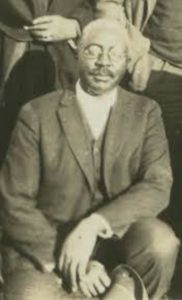
O. W. Gurley
*O. W. Gurley, a black teacher and businessman, was born on this date in 1868.
Ottowa W. Gurley was born in Huntsville, Alabama, to John and Rosanna Gurley, formerly enslaved persons, and grew up in Pine Bluff, Arkansas. After attending public schools and self-educating, he worked as a teacher and in the postal service. Gurley married his childhood sweetheart, Emma, who became a teacher and then took a relatively cushy job with the U.S. Postal Service, but he dreamed of a better life.
In 1889, along with his wife, he came to what was then known as Indian Territory to participate in the Oklahoma Land Rush, staking a claim in what would be known as Perry, Oklahoma. The young entrepreneur had just resigned from an appointment under President Grover Cleveland to strike out on his own." In Perry, he rose quickly, running unsuccessfully for treasurer of Noble County at first but later becoming principal at the town’s school and eventually starting and operating a general store for ten years. In 1905, Gurley sold his store and land in Perry and moved with his wife, Emma, to the oil boomtown of Tulsa, where he purchased 40 acres of land, which was "only to be sold to colored." The first law passed in the new State of Oklahoma, 33 days after statehood, established a Jim Crow system of legally enforced segregation and required blacks and whites to live in separate areas.
However, Gurley, politician Edward P. McCabe, and others considered Oklahoma a significant economic and social opportunity and established 50 all-black towns and settlements, among the highest of any state or territory. Among Gurley's first businesses was a rooming house located on a dusty trail near the railroad tracks. This road was named Greenwood Avenue, a city in Mississippi. The area became very popular among Black migrants fleeing oppression in Mississippi. They would find refuge in Gurley's building, as the racial persecution from the south was non-existent on Greenwood Avenue. On the contrary, the Greenwood District later became increasingly self-sustained and catered to upwardly mobile Black people. Gurley also provided monetary loans to Black people wanting to start their businesses. Gurley built three two-story buildings and five residences and bought an 80-acre farm in Rogers County. He founded Vernon AME Church and helped build a Black Masonic lodge and an employment agency. This implementation of "colored" segregation set the Greenwood boundaries of separation: Pine Street to the north, Archer Street and the Frisco tracks to the south, Cincinnati Street to the west, and Lansing Street to the east.
Gurley formed an informal partnership with another Black entrepreneur, J.B. Stradford, who arrived in Tulsa in 1899 and developed Greenwood together. In 1914, Gurley's net worth was reported to be $150,000 (about $3 million in 2018). And he was made a sheriff's deputy by the city of Tulsa to police Greenwood's residents, which resulted in some viewing him with suspicion. By 1921, Gurley owned more than one hundred properties in Greenwood and had an estimated net worth between $500,000 and $1 million (between $6.8 million and $13.6 million in 2018 dollars).
Gurley's prominence and wealth were short-lived, and his position as a sheriff's deputy did not protect him during the Tulsa Race Riot. In a matter of hours, he lost everything. During the race massacre, The Gurley Hotel, the Gurley family home, with-it Brunswick Billiard Parlor and Dock Eastmand & Hughes Café, a two-story building, Carter's Barbershop, Hardy Rooms, a pool hall, and cigar store all were reduced to ruins. According to his account and court records, he lost nearly $200,000 in the 1921 riot.
Because of his leadership role in creating this self-sustaining exclusive Black "enclave," it has been rumored that Gurley was lynched by a white mob and buried in an unmarked grave, however, according to the memoirs of Greenwood pioneer B.C. Franklin, Gurley left Greenwood for Los Angeles, California. Gurley and his wife, Emma, moved to a 4-bedroom home in South Los Angeles and ran a small hotel. O. W. Gurley, once one of the wealthiest Black men and a founder of Tulsa’s "Black Wall Street," died c. 1935. He was honored in a 2009 documentary film called Before They Die! The Road to Reparations for the 1921 Tulsa Race Riot Survivors.